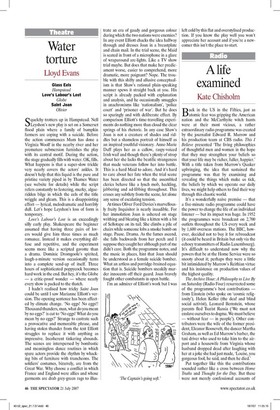Water torture
Lloyd Evans Glass Eels Hampstead Love's Labour's Lost Globe Saint Joan Olivier Squelchy trotters up in Hampstead. Nell Leyshon's new play is set on a Somerset flood plain where a family of bumpkin farmers are coping with a suicide. Before the action commences Mum has done a Virginia Woolf in the nearby river and her premature submersion furnishes the play with its central motif. During the action, the stage gradually fills with water. OK, fills. What happens is that a super-slow trickle very nearly covers the actors' ankles. It doesn't help that this liquid is the pure and pristine variety piped in by Thames Water (see website for details) while the script refers constantly to festering, murky, algaeridden bilge in which the eels of the title wriggle and gleam. This is a disappointing effort — lyrical, melodramatic and horribly dull. Let's hope Leyshon's loss of form is temporary.
Love's Labour's Lost is an exceedingly silly early play. Shakespeare the beginner assumed that having three pairs of lovers would give him three times as much romance. Instead it makes everything diffuse and repetitive, and the experiment seems more like a scripted gavotte than a drama. Dominic Dromgoole's spirited, laugh-a-minute version occasionally turns into a complete send-up of itself. Three hours of sophisticated poppycock becomes hard work in the end. But hey, it's the Globe — a critic-proof wonder — where nearly every show is packed to the thatch.
I hadn't realised how tricky Saint Joan could be until I saw Marianne Elliott's version. The opening sentence has been affected by climate change. `No eggs! No eggs!! Thousand thunders, man, what do you mean by no eggs?' is cut to `No eggs! What do you mean by no eggs?' Strange to castrate such a provocative and memorable phrase, and having stolen thunder from the text Elliott struggles to replace it with anything as impressive. Incoherent tinkering abounds. The scenes are interspersed by bombastic and meaningless dance routines in which spare actors provide the rhythm by whacking bits of furniture with truncheons. The soldiers' costumes, bizarrely, are from the Great War. Why choose a conflict in which France and England were allies and whose garments are drab grey-green rags to illustrate an era of gaudy and gorgeous colour during which the two nations were enemies? In any event Elliott chucks the idea halfway through and dresses Joan in a breastplate and chain mail. In the trial scene, the Maid is seated in front of a microphone in a glare of wraparound arc-lights. Like a TV show trial maybe. But does that make her predicament worse, easier to comprehend, more dramatic, more poignant? Nope. The trouble with this shifty and allusive conceptualism is that Shaw's rational plain-speaking manner spews it straight back at you. His script is already packed with explanation and analysis, and he occasionally smuggles in anachronisms like 'nationalism', 'police court' and 'prisoner of war'. But he does so sparingly and with deliberate effect. By comparison Elliott's time-travelling experiments do nothing more than cloud the clear springs of his rhetoric. In any case Shaw's Joan is not a creature of shades and riddles but a shameless portrait of himself as an inspired youthful visionary. Anne-Marie Duff plays her as a callow, raspy-voiced Irish waif and though there's plenty of strop about her she lacks the beatific strangeness that made veterans follow her into battle. This is a hard Maid to adore. And it's hard to care about her fate when the trial scene has been directed so that the assembled clerics behave like a lynch mob, heckling, jabbering and ad-libbing throughout. This erases any subtlety from the scene, let alone any sense of escalating tension.
At times Oliver Ford Davies's marvellously fruity Inquisitor is nearly inaudible. For her immolation Joan is ushered on stage writhing and bleating like a kitten with a bit of Sellotape on its tail. She climbs a pile of chairs while someone lobs a smoke bomb on stage. Pause. Drama. As the fumes ascend, she falls backwards from her perch and I suppose they caught her although part of me didn't care. Both the programme notes, and the music in places, hint that Joan should be understood as a female suicide bomber. What an artless and porridge-brained equation that is. Suicide bombers sneakily murder innocents off their guard. Joan bravely fought other combatants in open battle.
I'm an admirer of Elliott's work but I was left cold by this flat and overstylised production. If you know the play well you won't appreciate her account and if you're a newcomer this isn't the place to start.












































 Previous page
Previous page